Answer these simple questions and we will find you the BEST prices
Which type of solar quotes do you need?
It only takes 30 seconds
100% free with no obligation

Get Free quotes from loft conversion specialists near you

Save money by comparing quotes and choosing the most competitive offer

The service is 100% free and with no obligation
- GreenMatch
- Loft Conversion
- Loft Conversion Materials
- Loft Conversion Materials Cost
How Much Do Loft Conversion Materials Cost?

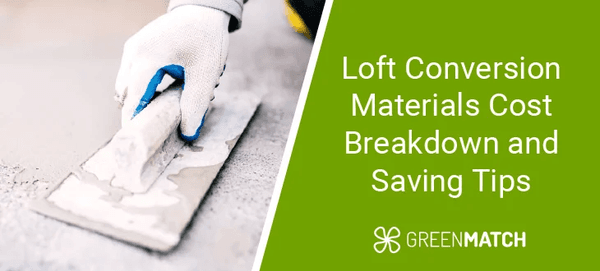
- Loft conversion materials typically cost between £1,200 and £2,500 per square metre, depending on the type of conversion.
- The most popular materials include timber beams, insulation, plasterboard, roofing materials, windows, flooring, and electrical wiring.
- If adding a bathroom, you'll also need plumbing fixtures.
A loft conversion is an exciting opportunity to transform your home, but knowing what materials you need and how much they’ll cost can be challenging.
Whether you're looking to create more space or add value to your property, making the right material choices is key.
This guide simplifies the process, giving you a clear breakdown of the essential materials, the loft conversion cost examples, and savvy tips on how to save money.
Ready to kick off your loft conversion? Save time by using this easy form to request up to 3 quotes from local installers. Click below to get started!
- Describe your needs
- Get free quotes
- Choose the best offer
It only takes 30 seconds



How much do loft conversion materials cost in the UK?
On average, loft conversion materials cost in the UK range from £1,200 to £2,500 per square metre, but this can fluctuate based on factors such as the location, the type of conversion, and the complexity of the existing roof structure.
Here are the factors that influence the total cost the most:
- Location: Labour and material costs may be higher in urban areas, especially in London.
- Size of the loft: Larger lofts require more materials, directly increasing the total cost.
- Existing roof structure: Older or more complex roofs may need additional structural support, increasing material and labour costs.
Let’s go over the loft conversion materials list:
Structural and building materials
Structural materials are crucial for the stability and safety of your loft conversion. They ensure the new space can support additional weight and comply with building regulations.
Here are the most common structural and building materials needed for a loft conversion:
| Loft conversion materials | Average cost range |
|---|---|
| Timber beams & joists | £20–£50 per metre |
| Roofing tiles | £50–£100 per square metre |
| Steel beams (RSJs) | £100–£300 per beam |
While these materials are typically required, smaller projects, such as basic Velux conversions, may involve fewer structural adjustments. This can help reduce your overall loft conversion cost.
Insulation materials
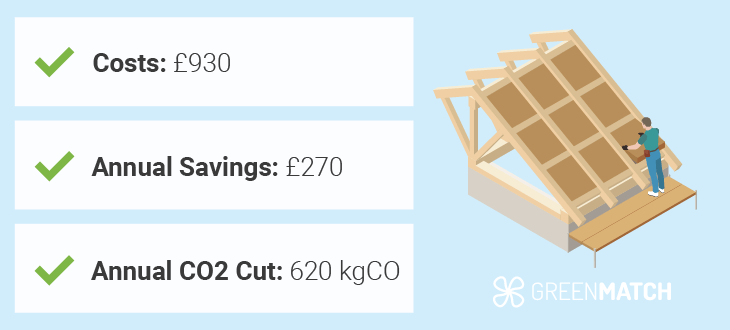
Insulation is essential for maintaining temperature control and enhancing energy efficiency in your loft conversion.
It effectively minimises heat loss during winter and prevents heat buildup in summer, helping to maintain a comfortable indoor environment without over-reliance on heating or cooling systems.
This leads to lower energy consumption, cutting down on utility bills and reducing the home's overall carbon footprint, making it a more sustainable choice.
Additionally, insulation improves soundproofing, creating a quieter, more serene space, which is particularly beneficial in a loft conversion where external noise can be more intrusive.
Here are the most popular insulation types and prices:
| Insulation type | Average cost per sqm |
|---|---|
| Fibreglass insulation | £10 |
| Mineral wool insulation | £13–£17.5 |
| Reflective foil insulation | £15–£30 |
| Sheep's wool insulation | £17.5–£22 |
| Spray foam insulation | £21.5 |
Opt for natural materials like sheep’s wool or recycled cotton for eco-friendly insulation. Consider plant-based foams or cellulose insulation, and look for certifications like BREEAM or LEED for sustainability assurance.
Interior finishing and aesthetic materials
Interior finishing materials are the final elements that turn your loft conversion into a comfortable, well-finished space. These materials enhance both the appearance and functionality of the loft, adding durability while creating a polished, livable environment.
Here are the most popular finishing and aesthetic loft conversion materials required:
- Plasterboard for walls and ceilings: Covers insulation and framing, providing a smooth surface for painting or wallpapering. Fire-resistant options may be required in some areas for added safety.
- Paint and wallpaper: Paint offers versatility with a wide range of colours and finishes. Wallpaper adds texture and design, often used for accent walls.
- Trim and moulding: Skirting boards, door casings, and crown moulding add a polished look, covering gaps and enhancing the room’s aesthetic.
- Flooring materials: Wood adds warmth and elegance, while laminate offers a durable, budget-friendly alternative. Carpet provides comfort for bedrooms, and vinyl, being waterproof and easy to clean, is ideal for bathrooms or kitchens.
The table below illustrates the average costs for finishing and aesthetic materials:
| Material | Average cost |
|---|---|
| Plasterboard for walls and ceilings | £2–£5 per sqm |
| Paint and wallpaper | £10–£50 per can/roll |
| Trim and moulding | £5–£15 per metre |
| Wood flooring | £30–£100 per sqm |
| Laminate flooring | £15–£30 per sqm |
| Carpet flooring | £5–£20 per sqm |
| Vinyl flooring | £10–£50 per sqm |
Windows, doors and staircase
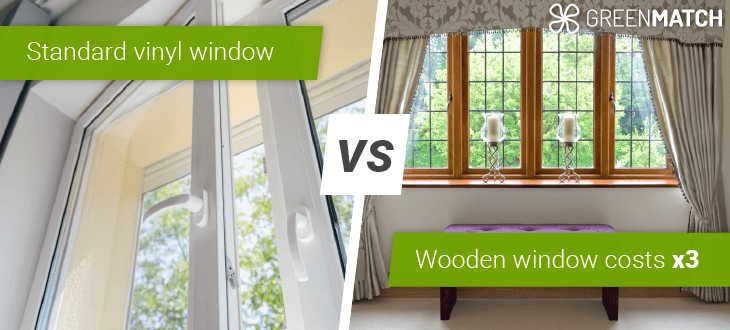
Windows, doors, and staircases are crucial components of any loft conversion, providing access, light, ventilation, and safe passage between floors. These materials not only contribute to the functionality of the space but also influence the overall aesthetic and energy efficiency of your loft.
Windows
Windows are typically chosen based on the type of conversion:
- Velux windows are integrated directly into the roof and are ideal for conversions that don’t alter the roof structure. They cost between £500 to £1,500 per window, depending on size and glazing.
- Dormer windows are installed as part of a dormer extension. They cost between £1,000 and £2,500 per window, depending on size and materials.
Select energy-efficient windows with double or triple glazing to minimise heat loss. Choose frames made from FSC-certified wood or recycled aluminium, and ensure they are Energy Star certified for optimal sustainability.
Doors
Doors are essential for dividing spaces and ensuring privacy. Interior doors for loft conversions can vary in price based on the material and design:
- Standard interior doors cost between £100 to £300 per door, depending on the material (e.g., wood, composite).
- Sliding or pocket doors are generally priced at £150 to £500.
Staircases
Staircases provide access to the loft, and the type of staircase you choose will affect both space and cost:
- Standard straight staircase: £1,000 to £3,000, depending on materials and design.
- Spiral staircase: A more compact option, costing between £2,000 and £5,000.
- Winder staircase: This staircase turns at an angle, priced around £1,500 to £4,000.
Utility and infrastructure materials
These materials ensure your loft has proper electrical wiring, plumbing, lighting, and heating. Without these, the space wouldn't be suitable for regular use or meet building regulations.
Below is a table with the average costs for some of the most important utility and infrastructure materials:
| Material | Average cost |
|---|---|
| Wiring and electrical fixtures | £1,500–£3,000 |
| Plumbing pipes and fittings | £1,000–£2,500 |
| Lighting fixtures | £50–£200 per fixture |
| Heating systems (radiators) | £100–£300 per radiator |
| Heating systems (underfloor) | £50–£100 per sqm |
Bathroom materials
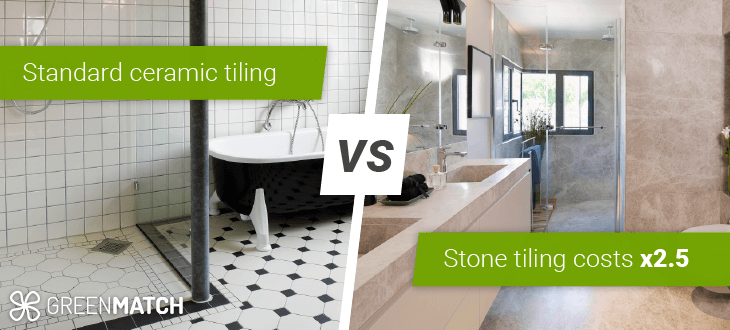
If you’re including a bathroom in your loft conversion, it’s important to plan for the necessary materials to make the space functional and comfortable.
A well-equipped loft bathroom will require specific plumbing fixtures and fittings, alongside materials for flooring, walls, and ventilation.
These materials not only add value to your conversion but also ensure your bathroom meets modern standards for comfort and durability.
Below is a table detailing the average costs for common bathroom materials:
| Material | Average cost |
|---|---|
| Bathtub | £200–£1,000 |
| Shower enclosure | £300–£800 |
| Toilet | £100–£300 |
| Sink | £50–£300 |
| Plumbing pipes/fittings | £1,000–£2,500 |
| Tiling (floor/wall) | £20–£50 per sqm |
| Ventilation fan | £50–£200 |
| Bathroom lighting | £50–£200 per fixture |
For a sustainable bathroom, choose low-flow fixtures to conserve water and opt for recycled or reclaimed materials like tiles or wood for vanities. Consider using natural stone or bamboo for flooring and look for eco-friendly paint with low VOC levels to reduce environmental impact.
To get an accurate understanding of why loft conversions are so expensive and how much your materials will cost, it’s crucial to consult with multiple loft conversion professionals.
Every project is unique, and factors such as the size of your loft, the materials you choose, and the complexity of the design will all affect the final price.
Getting personalised loft conversion quotes from local installers will give you a clearer picture of the costs tailored specifically to your home.
Use the form below to request up to 3 quotes from local loft conversion specialists today!
Click below to begin!
- Describe your needs
- Get free quotes
- Choose the best offer
It only takes 30 seconds



Tips to secure the best prices for your loft conversion materials
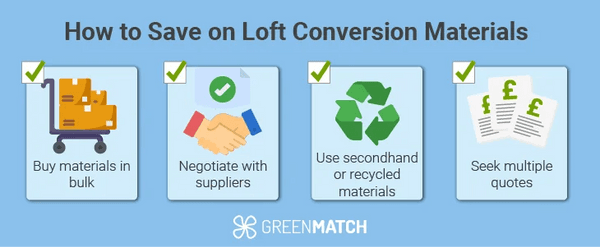
Reducing the cost of materials for loft conversion doesn’t have to mean compromising on quality. With a few savvy strategies, you can secure better prices and make the most of your budget.
Buy materials in bulk
When buying loft conversion building materials in bulk, it's important to plan ahead to avoid unnecessary costs. Work closely with your contractor or architect to accurately determine how much material you’ll need for your entire loft conversion.
By ordering everything at once, you can reduce the risk of paying multiple delivery charges. Moreover, this approach is much better for the environment compared to multiple deliveries. If others in your neighbourhood are also working on home improvement projects, consider pooling your orders together to reach the bulk discount threshold.
Additionally, ensure you have adequate storage space to hold materials if you're buying in bulk. Some suppliers may offer a better price if you can store the materials on-site and avoid multiple deliveries.
Negotiate with suppliers
Negotiating with suppliers can save you a significant amount of money. Before approaching suppliers, do your research on market prices for the materials you need. Being informed gives you a stronger position when negotiating.
If you’re purchasing a variety of materials—such as insulation, plasterboard, and flooring—from the same supplier, ask about package deals or bundle discounts. Suppliers often prefer larger orders and may be willing to offer a price reduction.
If you're planning future renovations, let them know. Offering repeat business gives suppliers an incentive to offer you better pricing, knowing there will be more orders in the future.
Use secondhand or recycled materials
Using secondhand or recycled materials is a great way to reduce costs while adding character to your loft conversion. Reclamation yards and online marketplaces are excellent places to find high-quality secondhand materials, such as reclaimed wood or vintage fixtures, at a fraction of the cost of new items.
You can also repurpose materials from other areas of your home, such as reusing old beams for shelving or flooring.
If your loft conversion includes a bathroom or kitchenette, consider looking for gently used or refurbished appliances, which can offer significant savings without sacrificing quality.
It reduces the demand for new raw materials, minimises waste, and decreases the energy and resources required to produce new products. Reclaimed wood, recycled tiles, and secondhand fixtures can add unique character to your loft conversion while supporting eco-friendly building practices.
Seek multiple quotes
Always seek multiple quotes when purchasing materials or hiring contractors. Request detailed quotes that include a clear breakdown of material and labour costs, as this will help you compare offers more effectively.
When you have quotes in hand, don’t hesitate to use them as leverage. Many suppliers and contractors will match or even beat a competitor’s price to secure your business.
Additionally, ask for recommendations from your contractor or from friends who have recently completed a loft conversion. They might be able to point you toward suppliers who offer better deals, helping you make more informed and cost-effective decisions.
Get started quickly and easily—fill out this simple form to request up to 3 quotes from local installers and start planning your loft conversion today.
Click below to begin!
- Describe your needs
- Get free quotes
- Choose the best offer
It only takes 30 seconds



FAQ
Materials typically cost between £1,200 and £2,500 per square metre, depending on the type of conversion and materials used.
You’ll need timber beams, insulation, plasterboard, roofing materials, windows, flooring, and electrical wiring. If adding a bathroom, you’ll also need plumbing fixtures.

Tania is an experienced writer who is passionate about addressing environmental issues through her work. Her writing aims to shed light on critical environmental challenges and advocate for sustainable solutions.
We strive to connect our customers with the right product and supplier. Would you like to be part of GreenMatch?

